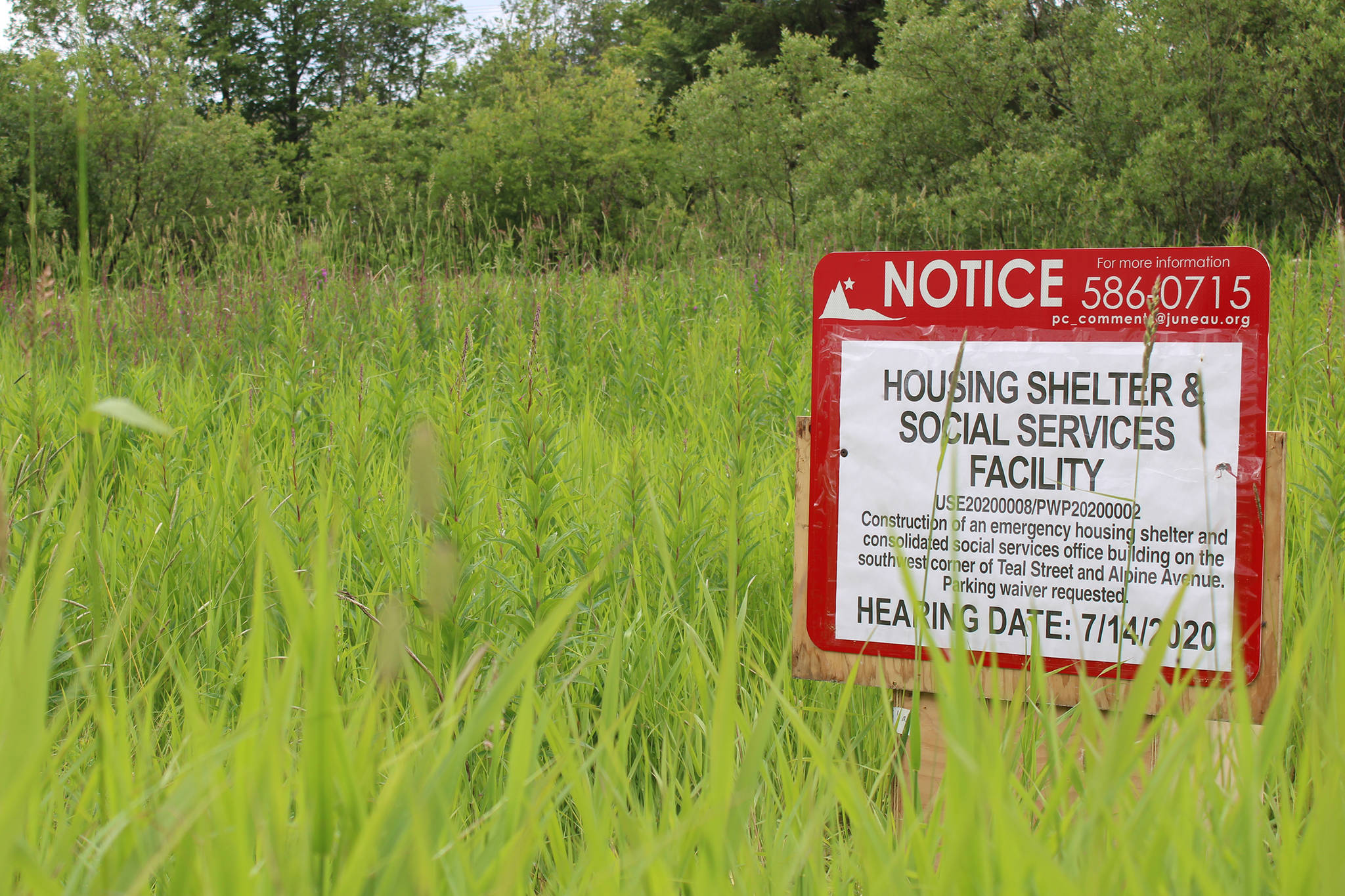A plan to consolidate social services in Juneau at a new campus in the Mendenhall Valley could take a step forward next week, if the City and Borough of Juneau approves its permits at a July 14 meeting of the Planning Commission.
The Glory Hall and United Human Services of Southeast Alaska want to build a social services campus at 8617 Teal Street near the Juneau International Airport.
The plan would bring several existing organizations together under one roof. Those organizations will still be responsible for their own programming and funding, said Joan O’Keefe, executive director of UHS and Southeast Alaska Independent Living, but they would share the same building.
Bringing service agencies together under one roof will allow for cost-saving efficiencies and make it easier for both service providers and those in need, O’Keefe said.
“What we’re doing is making that delivery of services more efficient for both the providers and those who need those services,” O’Keefe said. “What we’re trying to do is provide a solution. There are homeless people in this community, we know that. It’s wise to put services and solutions out on this campus.”
[City needs to weigh role in social services, manager says]
UHS is a group of nonprofit agencies working together to provide services including, SAIL, Disability Law Center of Alaska, National Alliance on Mental Illness, Alaska Legal Services, Big Brothers Big Sisters of Alaska and United Way of Southeast Alaska, according to the UHS website.
Many of these organizations are currently renting their own offices, O’Keefe said, but under one roof they can share office space and better coordinate their services. There’s a lot of overlap between the people served by the various agencies, O’Keefe said, and having all those services available in one place will make things easier on both providers and the needy.
The problem is finding money to actually build the new campus, said Mariya Lovishchuk, executive director of Glory Hall. The new building is just going to house existing and already funded social service programs, not add any new ones.
“What we do for the amount of money we get is a lot,” Lovishchuk said.
Funding for Glory Hall is largely split among money from the city, state and grants, according to Lovishchuk. Despite a predicted economic downturn in funding for social services, need for those services is expected to remain, if not grow.
“When you think about people who are experiencing homelessness, this already costs money if we don’t deal with it,” Lovishchuk said.
City Manager Rorie Watt told the city Assembly at a June 22, meeting that demand for services is already high and local agencies are struggling. The city needs should consider how involved it wants to be in providing social services, Watt said, considering economic fallout from the COVID-19 pandemic is likely to increase demand.
[Glory haul: Juneau homeless shelter eyes move to Mendenhall Valley]
There have been multiple community meetings to discuss potential problems, particularly the campus becoming a gathering place for homeless people, many of whom have mental health and substance misuse issues. But the campus will be more self-contained than the existing building downtown on Franklin Street, Lovishchuk said.
“I think when people see what’s happening downtown, that’s what they envision when they hear there’s going to be a social services campus,” she said. “I don’t think that’s going to be the reality at all.”
The two organizations have submitted a joint application for a permit to build on the land, O’Keefe said, but will eventually divide the plot so each organization owns its own land. Next Tuesday, the Planning Commission will vote to approve a conditional use permit for an emergency shelter and a social services building and a waiver for parking spaces.
O’Keefe has already contacted multiple charitable organizations that might contribute to the project, but once the permit is approved she plans to ramp up efforts to make the plan a reality.
“Yes, it’s a heavy lift. Yes, we have to raise the money and we have to sustain (programs),” O’Keefe said. ” We’re putting the puzzle together on funding to make sure it’s affordable and sustainable and we’re so gratified by all the community support.”
Lovishchuk said the project has received more positive feedback in public comments than she anticipated and argued the campus will help stabilize a lot of homeless people who already live in that area.
What’s more, there’s already been a social services organization near the proposed location for years now, said Dave Ringle, general manager at the St. Vincent de Paul Society.
“A lot of people don’t realize this shelter’s been here for 30 years,” Ringle said of St. Vincent’s housing campus located on Teal Street near the proposed site. “We’ve had some rocky times with businesses in the past, but nothing we haven’t worked out.”
St. Vincent’s offers transitional housing for people moving out of homelessness, as well as other low-income people and families, many of whom receive services from the organizations to be housed at the Teal Street campus, Ringle said.
“A program needs to be well delivered to be effective,” Ringle said. “Once they get the services, there are some people who are coming back and returning the favor. Giving people a chance sometimes yields the best results.”
The Planning Commission will vote on the permits July 14 at 7 p.m. Public testimony will be taken at the meeting via phone and written comment can be submitted at any time to the Commission’s email, PC_Comments@juneau.org.
• Contact reporter Peter Segall at psegall@juneauempire.com. Follow him on Twitter at @SegallJnoEmpire.

